2022届高考英语二轮复习:状语从句课件(24张)
文档属性
| 名称 | 2022届高考英语二轮复习:状语从句课件(24张) | 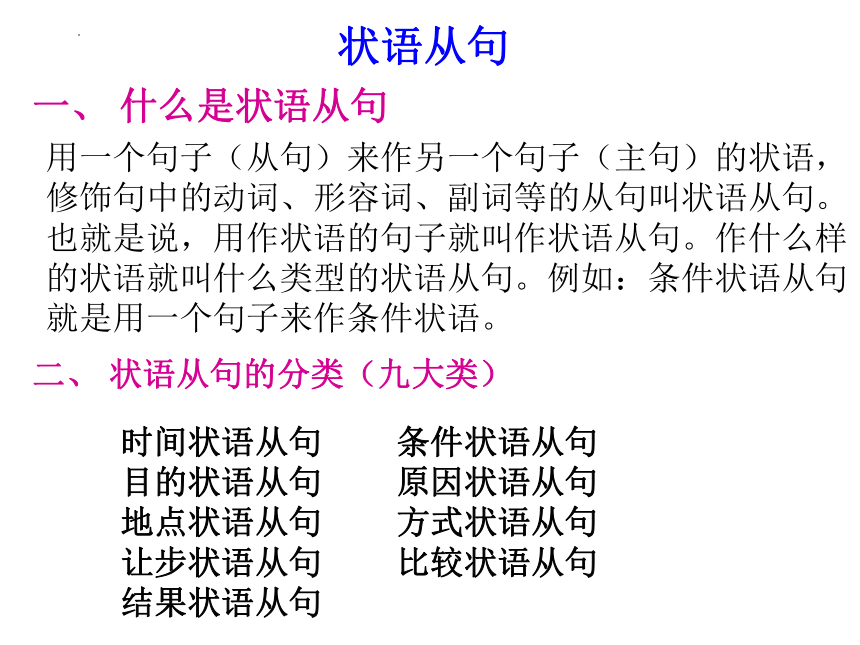 | |
| 格式 | pptx | ||
| 文件大小 | 109.7KB | ||
| 资源类型 | 教案 | ||
| 版本资源 | 通用版 | ||
| 科目 | 英语 | ||
| 更新时间 | 2022-02-28 08:06:36 | ||
图片预览

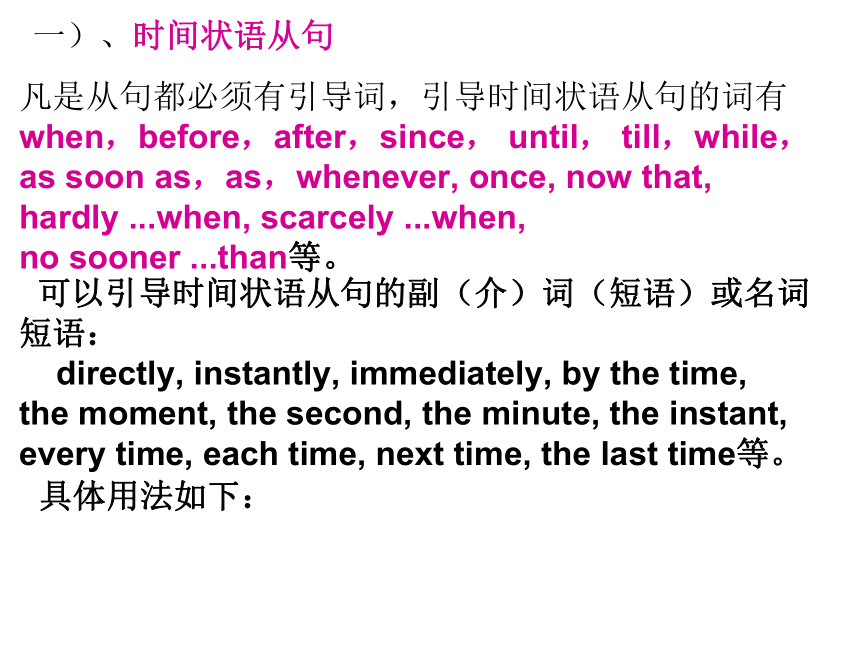
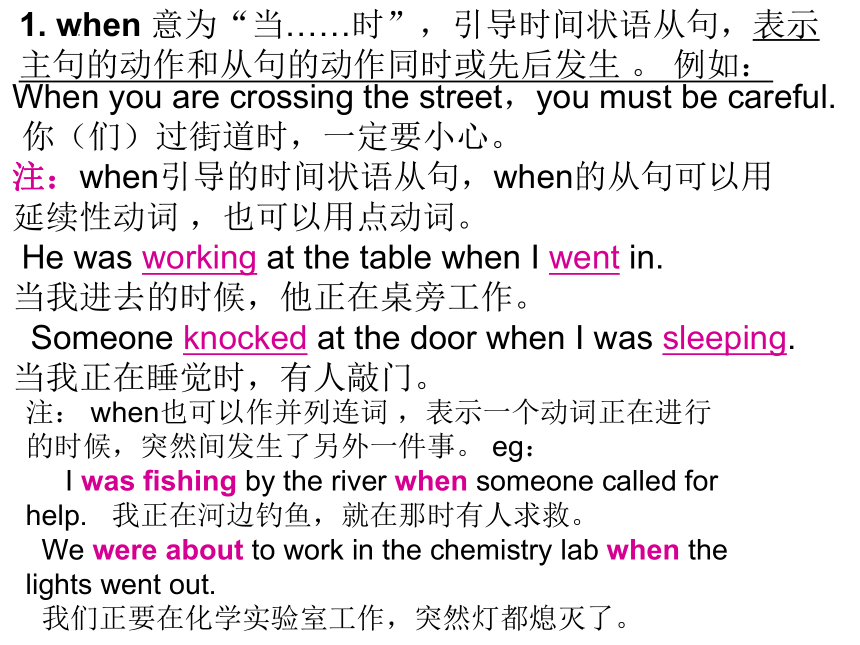
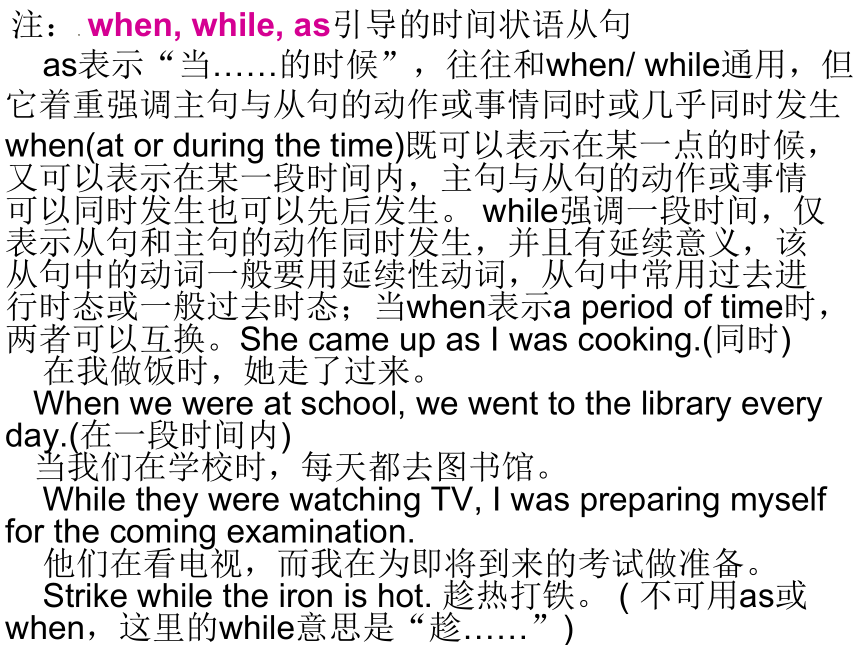
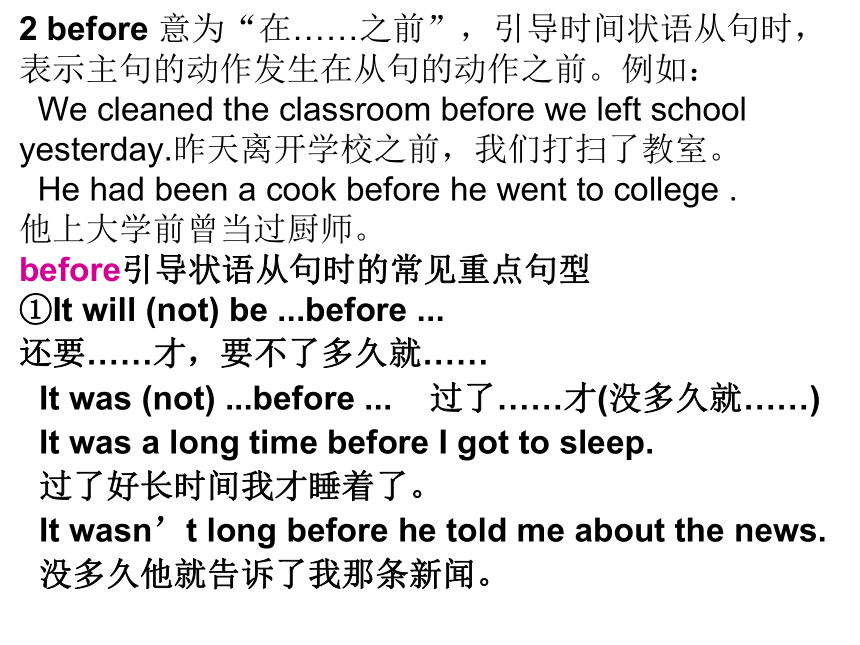
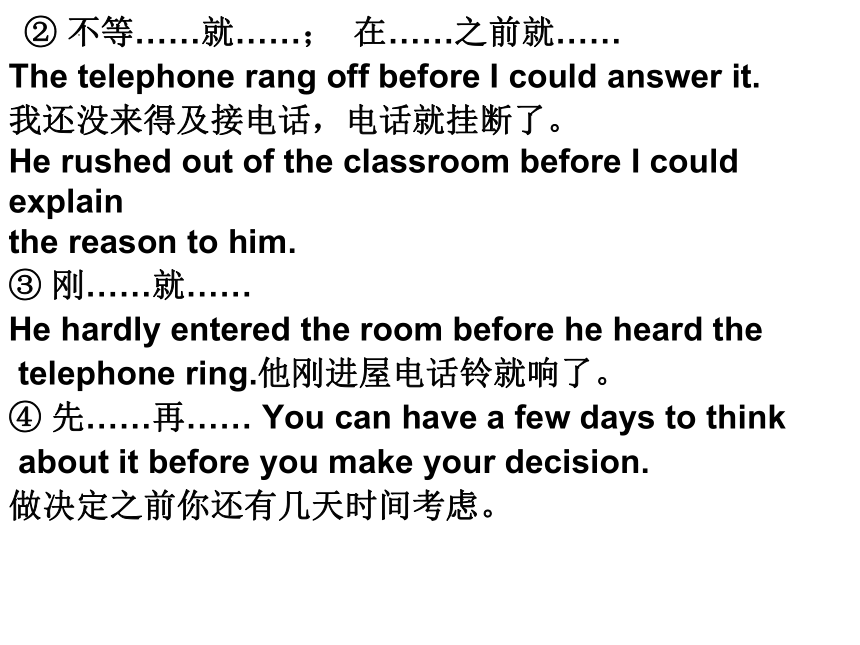
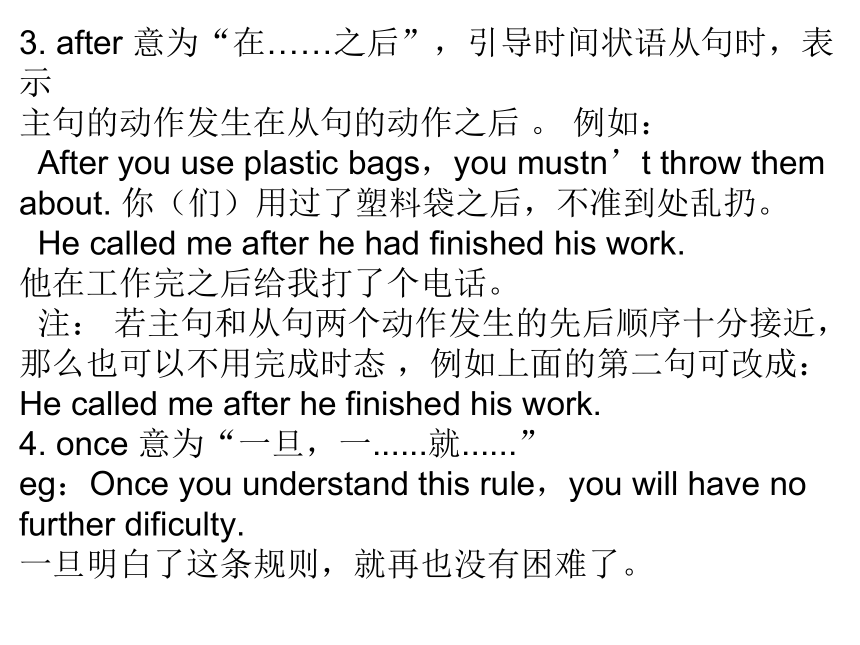
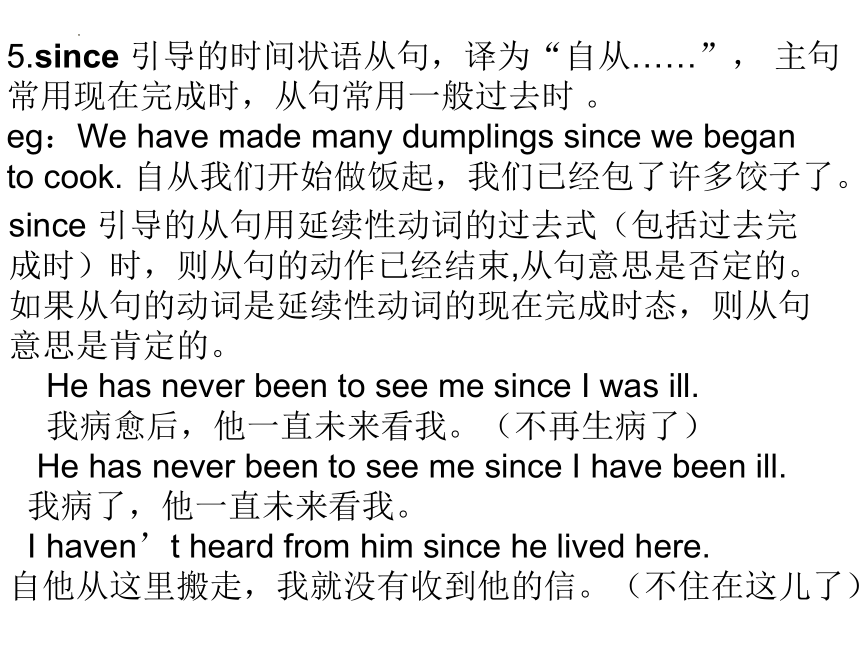
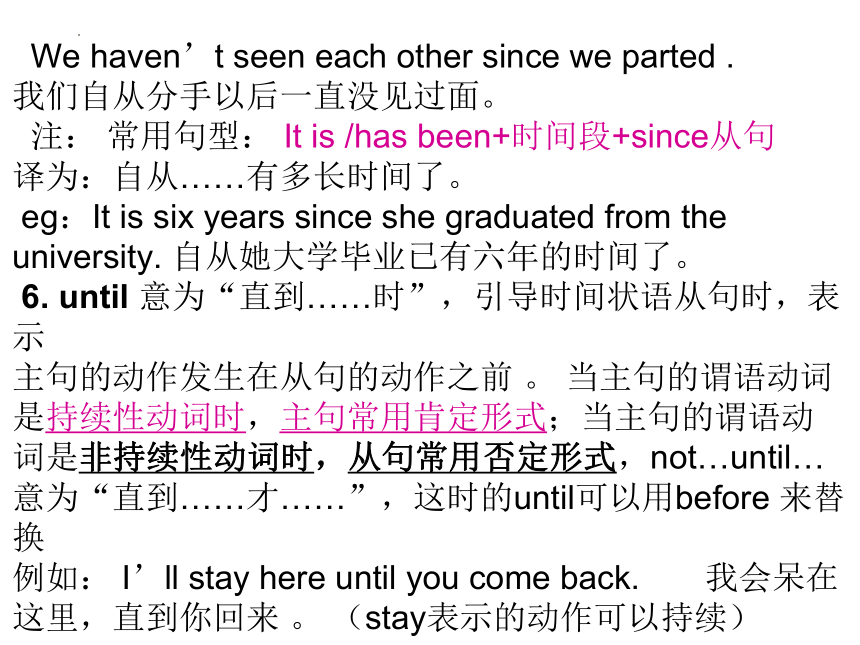
文档简介
(共24张PPT)
用一个句子(从句)来作另一个句子(主句)的状语,
修饰句中的动词、形容词、副词等的从句叫状语从句。
也就是说,用作状语的句子就叫作状语从句。作什么样
的状语就叫什么类型的状语从句。例如:条件状语从句
就是用一个句子来作条件状语。
状语从句
一、 什么是状语从句
二、 状语从句的分类(九大类)
时间状语从句 条件状语从句
目的状语从句 原因状语从句
地点状语从句 方式状语从句
让步状语从句 比较状语从句
结果状语从句
可以引导时间状语从句的副(介)词(短语)或名词
短语:
directly, instantly, immediately, by the time,
the moment, the second, the minute, the instant,
every time, each time, next time, the last time等。
凡是从句都必须有引导词,引导时间状语从句的词有
when,before,after,since, until, till,while,
as soon as,as,whenever, once, now that,
hardly ...when, scarcely ...when,
no sooner ...than等。
一)、时间状语从句
具体用法如下:
1. when 意为“当……时”,引导时间状语从句,表示
主句的动作和从句的动作同时或先后发生 。 例如:
When you are crossing the street,you must be careful.
你(们)过街道时,一定要小心。
注:when引导的时间状语从句,when的从句可以用
延续性动词 ,也可以用点动词。
He was working at the table when I went in.
当我进去的时候,他正在桌旁工作。
Someone knocked at the door when I was sleeping.
当我正在睡觉时,有人敲门。
注: when也可以作并列连词 ,表示一个动词正在进行
的时候,突然间发生了另外一件事。 eg:
I was fishing by the river when someone called for
help. 我正在河边钓鱼,就在那时有人求救。
We were about to work in the chemistry lab when the
lights went out.
我们正要在化学实验室工作,突然灯都熄灭了。
注: when, while, as引导的时间状语从句
as表示“当……的时候”,往往和when/ while通用,但
它着重强调主句与从句的动作或事情同时或几乎同时发生
when(at or during the time)既可以表示在某一点的时候,
又可以表示在某一段时间内,主句与从句的动作或事情
可以同时发生也可以先后发生。 while强调一段时间,仅
表示从句和主句的动作同时发生,并且有延续意义,该
从句中的动词一般要用延续性动词,从句中常用过去进
行时态或一般过去时态;当when表示a period of time时,
两者可以互换。She came up as I was cooking.(同时)
在我做饭时,她走了过来。
When we were at school, we went to the library every day.(在一段时间内)
当我们在学校时,每天都去图书馆。
While they were watching TV, I was preparing myself for the coming examination.
他们在看电视,而我在为即将到来的考试做准备。
Strike while the iron is hot. 趁热打铁。 ( 不可用as或when,这里的while意思是“趁……”)
2 before 意为“在……之前”,引导时间状语从句时,
表示主句的动作发生在从句的动作之前。例如:
We cleaned the classroom before we left school
yesterday.昨天离开学校之前,我们打扫了教室。
He had been a cook before he went to college .
他上大学前曾当过厨师。
before引导状语从句时的常见重点句型
①It will (not) be ...before ...
还要……才,要不了多久就……
It was (not) ...before ... 过了……才(没多久就……)
It was a long time before I got to sleep.
过了好长时间我才睡着了。
It wasn’t long before he told me about the news.
没多久他就告诉了我那条新闻。
② 不等……就……; 在……之前就……
The telephone rang off before I could answer it.
我还没来得及接电话,电话就挂断了。
He rushed out of the classroom before I could explain
the reason to him.
③ 刚……就……
He hardly entered the room before he heard the
telephone ring.他刚进屋电话铃就响了。
④ 先……再…… You can have a few days to think
about it before you make your decision.
做决定之前你还有几天时间考虑。
3. after 意为“在……之后”,引导时间状语从句时,表示
主句的动作发生在从句的动作之后 。 例如:
After you use plastic bags,you mustn’t throw them
about. 你(们)用过了塑料袋之后,不准到处乱扔。
He called me after he had finished his work.
他在工作完之后给我打了个电话。
注: 若主句和从句两个动作发生的先后顺序十分接近,
那么也可以不用完成时态 ,例如上面的第二句可改成:
He called me after he finished his work.
4. once 意为“一旦,一......就......”
eg:Once you understand this rule,you will have no further dificulty.
一旦明白了这条规则,就再也没有困难了。
since 引导的从句用延续性动词的过去式(包括过去完
成时)时,则从句的动作已经结束,从句意思是否定的。
如果从句的动词是延续性动词的现在完成时态,则从句
意思是肯定的。
He has never been to see me since I was ill.
我病愈后,他一直未来看我。(不再生病了)
He has never been to see me since I have been ill.
我病了,他一直未来看我。
I haven’t heard from him since he lived here.
自他从这里搬走,我就没有收到他的信。(不住在这儿了)
5.since 引导的时间状语从句,译为“自从……”, 主句
常用现在完成时,从句常用一般过去时 。
eg:We have made many dumplings since we began
to cook. 自从我们开始做饭起,我们已经包了许多饺子了。
We haven’t seen each other since we parted .
我们自从分手以后一直没见过面。
注: 常用句型: It is /has been+时间段+since从句
译为:自从……有多长时间了。
eg:It is six years since she graduated from the
university. 自从她大学毕业已有六年的时间了。
6. until 意为“直到……时”,引导时间状语从句时,表示
主句的动作发生在从句的动作之前 。 当主句的谓语动词
是持续性动词时,主句常用肯定形式;当主句的谓语动
词是非持续性动词时,从句常用否定形式,not…until…
意为“直到……才……”,这时的until可以用before 来替换
例如: I’ll stay here until you come back. 我会呆在这里,直到你回来 。 (stay表示的动作可以持续)
He didn’t go to bed until he finished his homework.
他直到做完作业才睡觉。(go to bed 表示的动作不能持续)
如果till与until用在肯定句中时,可以换用。
注意until的倒装句和强调句。
I didn't recognize she was my classmate until
she took off her dark glasses.
=Not until she took off her dark glasses did I
recognise she was my classmate
=It was not until she took off her dark glasses that I
recognised she was my classmate.
直到她摘下墨镜,我才认出她是我的同学。
7. as soon as 意为“一……就……”,表示 从句的动作一
发生,主句的动作马上就发生 。 例如:
I’ll tell him about it as soon as he comes back.
他一回来我就告诉他这件事。
表示“一......就...... ”的词组还有hardly/scarcely...when,
no sooner...than...
二). 原因状语从句
引导原因状语从句的常见连词或短语:as, because,
since, now that, considering that, seeing that(鉴于……)。
注意以下几点:
(1) because, since, as, for, now that
because语气最强,用于回答why的提问,可与强调词
only, just 以及否定词not 连用。但不可以与so连用。
since 引导的从句语气次于because引导的从句,常表
示稍加分析后而推断出的原因,或指人们已知的事实,
比as正式一些,常置于句首。
as 语气最弱,其原因只是对结果的附带说明,一般放在
句首。
for虽然解释为“因为”但只是一个并列连词,它也常引导
句子表示原因,但不是原因状语从句,它是一个并列句。
for所提供的理由是一种补充性的说明,表示推测的理由。
now that意为“既然,由于”。表示由于人们已知的事实
或正在发生的事而产生某个结果。
He failed because he was careless.他因粗心而失败了。
Since everyone has come, let?s begin our meeting.
既然大家都来了,我们开会吧。
As all the seats were full, he stood there.
所有的座位都满了,他只好站那儿。
It might have rained last night for the ground is wet.
昨晚可能下雨了,因为地面是湿的。
Now that the kids have left home we have a lot of extra
space.
由于孩子们离开了家,所以我们有了额外的空间。
三). 地点状语从句
地点状语从句常由下列连词引导:where, wherever等。
You may find him where his brother lives.
你可能会在他哥哥居住的地方找到他。
You are free to go wherever you like.
你可以去你想要去的任何地方。
Anywhere he went, he got warm welcome.
无论他走到哪儿,都受到热烈欢迎。
The girl takes the doll with her everywhere she goes.
这个女孩无论去哪都带着她的布娃娃。
Where there is a will, there is a way. 有志者事竟成。
四). 结果状语从句
结果状语从句常由下列连词引导:
so ...that,such ...that,so that等。要注意以下几个
问题:
(1) 五种结构:
① so+adj./adv.+that ...
② such (a/an+adj.)+n.+that ...
③ so+adj.+a/an+n.+that=such a/an+adj.+n.+that ...
④ so many/much/few/little(少)+n.+that ...
⑤ such+(adj.) +n. (u/pl.)+ that
He spoke so fast that I couldn’t follow him.
他说的如此的快,我跟不上他。
It was such a lovely day / so lovely a day that we all
went swimming.
今天天气如此的好,我们大家都去游泳了。
(2) so或such置于句首时,主句常用倒装。
It was such a lovely day / so lovely a day that we all
went swimming.
=Such a lovely day was it that we all went swimming.
今天天气如此的好,我们大家都去游泳了。
(3)注意以上结构与定语从句so/such ...as的区别。
This is such an interesting/so interesting a film that
everyone wants to see it.
这是一部很有趣的电影以至于每个人都想去看。
五). 目的状语从句
目的状语从句由下列连词引导:so that, in order that,
for fear that, in case等。(注:so that也可用来引导结果
状语从句)
so that, in order that引导的目的状语从句中常需用
情态动词。
so that引导的目的状语从句只能放在主句之后。
in order that 引导的目的状语从句可以放在主句之前或之后。
We set out early so that we could see the sunrise.
我们很早出发以便能看到日出。
He sent the letter by air mail so that it might reach
them in time.
他空邮这封信以便他们能及时收到。
六). 条件状语从句
条件状语从句分为真实条件句和非真实条件句
(用在虚拟语气中)。注意:在真实条件句中,常用
一般时态代替将来时。常由下列连词引导条件状语从句:
if, unless, suppose, supposing, providing (that),
provided (that), given (that), in case, on condition that,
as long as, so long as, so far as等。
(1) unless=if not
You will fail unless you study hard.
除非你努力,否则你就要失败。
(2) suppose, supposing, providing(that),
provided(that), given(that)= if
Given that he supports us, we?ll win the election.
如果他支持我们,我们就会赢得选举。
(3)on condition that, as long as, so long as = only if
As long as you don’t lose heart, you will succeed.
只要你不灰心,你就会成功。
(4) as(so) far as ...
So far as I am concerned, I?m in favour of “mercy
killing”. 就我个人而言, 我支持安乐死。
七). 让步状语从句
引导让步状语从句的连词:although, though, as,
even if, even though,while, whether ...or, whoever,
whatever, however, no matter+疑问词等。注意以下几点:
(1) although, though引导让步状语从句时,主句前
不能用but,但可以加yet, still。
Though it was raining hard, yet they didn’t stop working.
尽管下着大雨,他们仍然在工作。
(2) as引导让步状语从句时,必须用前置结构,通常是
从句中的表语、状语或动词原形放在句首,放在句首的
名词前的冠词要去掉。
Though he is a child, he knows a lot.=Child as(though)
he is, he knows a lot.
尽管他是个孩子,但他仍知道的很多。(注意:在child前
不要用冠词)
Though I like it very much, I won?t buy it.=Much as I
like it, I won?t buy it.
尽管我非常喜欢它,但我也不会买它。
(3)whether ...or (not ) 引导的从句,提供两个对比的“尽管”
情况,含有条件意味。
(Whether you)Believe it or not, it is true.
信不信由你,这是真的。
Whether you come here or we go there, the topic of
discussion will remain unchanged.
不管是你来这儿还是我们去那儿,讨论的主题保持不变。
(4) 疑问词+ever=no matter +疑问词
Whoever you are, you must show your pass.
无论你是谁,你都必须出示你的通行证。
Whenever you come, you are welcome.
无论你什么时候来,都欢迎。
八). 方式状语从句
引导方式状语从句的连词或短语:as, as if, as though,
the way等。注意以下几点:
(1) as引导方式状语从句时意为“按照”,“如同”,前面
常用加强语气。
I did it just as you told me.
= I did it just as told to.
我是按照你的吩咐做的。
He didn?t win the match as expected.
他没有像预料的那样赢得比赛。
(2) as if和as though 引导的从句中,谓语常用虚拟语气,
有时也用陈述语气。
It seems as if it were going to rain.
天似乎要下雨了。
九)比较状语从句
比较状语从句的引导词有:
as...as,than,
1. as...as引导的比较状语从句
as...as表示同级比较,第二个as引导比较状语从句,在否定句中也可用so...as,中间用形容词或副词的原级形式,从句常常为省略句。如:
What a table! I’v never seen such a thing before. It's not half as wide as it is long.
2. than引导的比较状语从句
than引导的比较状语从句表示差别比较,主句中用形容词或副词的比较级形式,从句常常为省略句。如:
The weather turnedout to be very good,which was more than we could expect.
3. 特殊比较状语从句。像 the + 比较级......,the +比较级
结构。如:
The longer the war last, the more the people there
will suffer.
注意:状语从句中的省略现象
(1) 连接词+过去分词
Unless repaired, the washing machine is no use.
除非洗衣机被修好了,否则它就没用了。
(2) 连词+现在分词
Look out while crossing the street.
过马路时,要小心。
(3)连词+形容词/其他
常见的有if necessary, if possible, when necessary,
if any等。
(4) 比较状语从句中的省略
He arrived home half an hour earlier than (he had
been) expected.
他比预想的早到家半个小时。
注意:状语从句中的省略现象
(1) 连接词+过去分词
Unless repaired, the washing machine is no use.
除非洗衣机被修好了,否则它就没用了。
(2) 连词+现在分词
Look out while crossing the street.
过马路时,要小心。
(3)连词+形容词/其他
常见的有if necessary, if possible, when necessary,
if any等。
(4) 比较状语从句中的省略
He arrived home half an hour earlier than (he had
been) expected.
他比预想的早到家半个小时。
状语从句专题练习:一)选择填空
. I haven't heard from him ____ he went to America.
2. He won't be here _____ he is invited.
3. He will not go to the cinema _____ he is very busy.
4. We found the key _____ she had left it.
5. We found the books two days ____ he had gone away.
6. We had no sooner got to the station _____ the train left.
7. He speaks English ____ he were an Englishman.
8. He is explaining clearly _______ they could understand.
9. Do not leave the room _____ you have finished the test.
10. She sang ______ she went along.
since
unless
because
where
after
than
as if
so that
before
as
三)、完成句子
1. He announced the news about the failure of the experiment .(我还没来得及拦阻他)
2. You must form the habit of putting the book
back (原处).
3. ,I will remember the happy time we spent together.(每次我看到这礼物)
4. The man was badly injured but he acted ( 似乎什么也没有发生).
5. No sooner had we arrived (篮球赛就开始了).
before I could stop him
where it belongs
Each time I see the gift
as if nothing had happened
than the basketball match began
三) 翻译
1. 直到我们都意识到环境的重要性我们才能把它保护好。
We can't protect the environment well until we
realize its importance.
2. 我们必须努力工作,以使我们能过上好日子。
We must work hard so that we can live a better live.
3. 我没有什么可担心的,他是一个可以信赖的人。
I have nothing to worry about because he is a
person to depend on.
4. 他好像比我们想象的要自信很多,很令人惊讶。
He seems more confident than we have imagined.
5. 你最好按照计划好的去完成那个项目。
You’d better carry out the project as you have
planned.
用一个句子(从句)来作另一个句子(主句)的状语,
修饰句中的动词、形容词、副词等的从句叫状语从句。
也就是说,用作状语的句子就叫作状语从句。作什么样
的状语就叫什么类型的状语从句。例如:条件状语从句
就是用一个句子来作条件状语。
状语从句
一、 什么是状语从句
二、 状语从句的分类(九大类)
时间状语从句 条件状语从句
目的状语从句 原因状语从句
地点状语从句 方式状语从句
让步状语从句 比较状语从句
结果状语从句
可以引导时间状语从句的副(介)词(短语)或名词
短语:
directly, instantly, immediately, by the time,
the moment, the second, the minute, the instant,
every time, each time, next time, the last time等。
凡是从句都必须有引导词,引导时间状语从句的词有
when,before,after,since, until, till,while,
as soon as,as,whenever, once, now that,
hardly ...when, scarcely ...when,
no sooner ...than等。
一)、时间状语从句
具体用法如下:
1. when 意为“当……时”,引导时间状语从句,表示
主句的动作和从句的动作同时或先后发生 。 例如:
When you are crossing the street,you must be careful.
你(们)过街道时,一定要小心。
注:when引导的时间状语从句,when的从句可以用
延续性动词 ,也可以用点动词。
He was working at the table when I went in.
当我进去的时候,他正在桌旁工作。
Someone knocked at the door when I was sleeping.
当我正在睡觉时,有人敲门。
注: when也可以作并列连词 ,表示一个动词正在进行
的时候,突然间发生了另外一件事。 eg:
I was fishing by the river when someone called for
help. 我正在河边钓鱼,就在那时有人求救。
We were about to work in the chemistry lab when the
lights went out.
我们正要在化学实验室工作,突然灯都熄灭了。
注: when, while, as引导的时间状语从句
as表示“当……的时候”,往往和when/ while通用,但
它着重强调主句与从句的动作或事情同时或几乎同时发生
when(at or during the time)既可以表示在某一点的时候,
又可以表示在某一段时间内,主句与从句的动作或事情
可以同时发生也可以先后发生。 while强调一段时间,仅
表示从句和主句的动作同时发生,并且有延续意义,该
从句中的动词一般要用延续性动词,从句中常用过去进
行时态或一般过去时态;当when表示a period of time时,
两者可以互换。She came up as I was cooking.(同时)
在我做饭时,她走了过来。
When we were at school, we went to the library every day.(在一段时间内)
当我们在学校时,每天都去图书馆。
While they were watching TV, I was preparing myself for the coming examination.
他们在看电视,而我在为即将到来的考试做准备。
Strike while the iron is hot. 趁热打铁。 ( 不可用as或when,这里的while意思是“趁……”)
2 before 意为“在……之前”,引导时间状语从句时,
表示主句的动作发生在从句的动作之前。例如:
We cleaned the classroom before we left school
yesterday.昨天离开学校之前,我们打扫了教室。
He had been a cook before he went to college .
他上大学前曾当过厨师。
before引导状语从句时的常见重点句型
①It will (not) be ...before ...
还要……才,要不了多久就……
It was (not) ...before ... 过了……才(没多久就……)
It was a long time before I got to sleep.
过了好长时间我才睡着了。
It wasn’t long before he told me about the news.
没多久他就告诉了我那条新闻。
② 不等……就……; 在……之前就……
The telephone rang off before I could answer it.
我还没来得及接电话,电话就挂断了。
He rushed out of the classroom before I could explain
the reason to him.
③ 刚……就……
He hardly entered the room before he heard the
telephone ring.他刚进屋电话铃就响了。
④ 先……再…… You can have a few days to think
about it before you make your decision.
做决定之前你还有几天时间考虑。
3. after 意为“在……之后”,引导时间状语从句时,表示
主句的动作发生在从句的动作之后 。 例如:
After you use plastic bags,you mustn’t throw them
about. 你(们)用过了塑料袋之后,不准到处乱扔。
He called me after he had finished his work.
他在工作完之后给我打了个电话。
注: 若主句和从句两个动作发生的先后顺序十分接近,
那么也可以不用完成时态 ,例如上面的第二句可改成:
He called me after he finished his work.
4. once 意为“一旦,一......就......”
eg:Once you understand this rule,you will have no further dificulty.
一旦明白了这条规则,就再也没有困难了。
since 引导的从句用延续性动词的过去式(包括过去完
成时)时,则从句的动作已经结束,从句意思是否定的。
如果从句的动词是延续性动词的现在完成时态,则从句
意思是肯定的。
He has never been to see me since I was ill.
我病愈后,他一直未来看我。(不再生病了)
He has never been to see me since I have been ill.
我病了,他一直未来看我。
I haven’t heard from him since he lived here.
自他从这里搬走,我就没有收到他的信。(不住在这儿了)
5.since 引导的时间状语从句,译为“自从……”, 主句
常用现在完成时,从句常用一般过去时 。
eg:We have made many dumplings since we began
to cook. 自从我们开始做饭起,我们已经包了许多饺子了。
We haven’t seen each other since we parted .
我们自从分手以后一直没见过面。
注: 常用句型: It is /has been+时间段+since从句
译为:自从……有多长时间了。
eg:It is six years since she graduated from the
university. 自从她大学毕业已有六年的时间了。
6. until 意为“直到……时”,引导时间状语从句时,表示
主句的动作发生在从句的动作之前 。 当主句的谓语动词
是持续性动词时,主句常用肯定形式;当主句的谓语动
词是非持续性动词时,从句常用否定形式,not…until…
意为“直到……才……”,这时的until可以用before 来替换
例如: I’ll stay here until you come back. 我会呆在这里,直到你回来 。 (stay表示的动作可以持续)
He didn’t go to bed until he finished his homework.
他直到做完作业才睡觉。(go to bed 表示的动作不能持续)
如果till与until用在肯定句中时,可以换用。
注意until的倒装句和强调句。
I didn't recognize she was my classmate until
she took off her dark glasses.
=Not until she took off her dark glasses did I
recognise she was my classmate
=It was not until she took off her dark glasses that I
recognised she was my classmate.
直到她摘下墨镜,我才认出她是我的同学。
7. as soon as 意为“一……就……”,表示 从句的动作一
发生,主句的动作马上就发生 。 例如:
I’ll tell him about it as soon as he comes back.
他一回来我就告诉他这件事。
表示“一......就...... ”的词组还有hardly/scarcely...when,
no sooner...than...
二). 原因状语从句
引导原因状语从句的常见连词或短语:as, because,
since, now that, considering that, seeing that(鉴于……)。
注意以下几点:
(1) because, since, as, for, now that
because语气最强,用于回答why的提问,可与强调词
only, just 以及否定词not 连用。但不可以与so连用。
since 引导的从句语气次于because引导的从句,常表
示稍加分析后而推断出的原因,或指人们已知的事实,
比as正式一些,常置于句首。
as 语气最弱,其原因只是对结果的附带说明,一般放在
句首。
for虽然解释为“因为”但只是一个并列连词,它也常引导
句子表示原因,但不是原因状语从句,它是一个并列句。
for所提供的理由是一种补充性的说明,表示推测的理由。
now that意为“既然,由于”。表示由于人们已知的事实
或正在发生的事而产生某个结果。
He failed because he was careless.他因粗心而失败了。
Since everyone has come, let?s begin our meeting.
既然大家都来了,我们开会吧。
As all the seats were full, he stood there.
所有的座位都满了,他只好站那儿。
It might have rained last night for the ground is wet.
昨晚可能下雨了,因为地面是湿的。
Now that the kids have left home we have a lot of extra
space.
由于孩子们离开了家,所以我们有了额外的空间。
三). 地点状语从句
地点状语从句常由下列连词引导:where, wherever等。
You may find him where his brother lives.
你可能会在他哥哥居住的地方找到他。
You are free to go wherever you like.
你可以去你想要去的任何地方。
Anywhere he went, he got warm welcome.
无论他走到哪儿,都受到热烈欢迎。
The girl takes the doll with her everywhere she goes.
这个女孩无论去哪都带着她的布娃娃。
Where there is a will, there is a way. 有志者事竟成。
四). 结果状语从句
结果状语从句常由下列连词引导:
so ...that,such ...that,so that等。要注意以下几个
问题:
(1) 五种结构:
① so+adj./adv.+that ...
② such (a/an+adj.)+n.+that ...
③ so+adj.+a/an+n.+that=such a/an+adj.+n.+that ...
④ so many/much/few/little(少)+n.+that ...
⑤ such+(adj.) +n. (u/pl.)+ that
He spoke so fast that I couldn’t follow him.
他说的如此的快,我跟不上他。
It was such a lovely day / so lovely a day that we all
went swimming.
今天天气如此的好,我们大家都去游泳了。
(2) so或such置于句首时,主句常用倒装。
It was such a lovely day / so lovely a day that we all
went swimming.
=Such a lovely day was it that we all went swimming.
今天天气如此的好,我们大家都去游泳了。
(3)注意以上结构与定语从句so/such ...as的区别。
This is such an interesting/so interesting a film that
everyone wants to see it.
这是一部很有趣的电影以至于每个人都想去看。
五). 目的状语从句
目的状语从句由下列连词引导:so that, in order that,
for fear that, in case等。(注:so that也可用来引导结果
状语从句)
so that, in order that引导的目的状语从句中常需用
情态动词。
so that引导的目的状语从句只能放在主句之后。
in order that 引导的目的状语从句可以放在主句之前或之后。
We set out early so that we could see the sunrise.
我们很早出发以便能看到日出。
He sent the letter by air mail so that it might reach
them in time.
他空邮这封信以便他们能及时收到。
六). 条件状语从句
条件状语从句分为真实条件句和非真实条件句
(用在虚拟语气中)。注意:在真实条件句中,常用
一般时态代替将来时。常由下列连词引导条件状语从句:
if, unless, suppose, supposing, providing (that),
provided (that), given (that), in case, on condition that,
as long as, so long as, so far as等。
(1) unless=if not
You will fail unless you study hard.
除非你努力,否则你就要失败。
(2) suppose, supposing, providing(that),
provided(that), given(that)= if
Given that he supports us, we?ll win the election.
如果他支持我们,我们就会赢得选举。
(3)on condition that, as long as, so long as = only if
As long as you don’t lose heart, you will succeed.
只要你不灰心,你就会成功。
(4) as(so) far as ...
So far as I am concerned, I?m in favour of “mercy
killing”. 就我个人而言, 我支持安乐死。
七). 让步状语从句
引导让步状语从句的连词:although, though, as,
even if, even though,while, whether ...or, whoever,
whatever, however, no matter+疑问词等。注意以下几点:
(1) although, though引导让步状语从句时,主句前
不能用but,但可以加yet, still。
Though it was raining hard, yet they didn’t stop working.
尽管下着大雨,他们仍然在工作。
(2) as引导让步状语从句时,必须用前置结构,通常是
从句中的表语、状语或动词原形放在句首,放在句首的
名词前的冠词要去掉。
Though he is a child, he knows a lot.=Child as(though)
he is, he knows a lot.
尽管他是个孩子,但他仍知道的很多。(注意:在child前
不要用冠词)
Though I like it very much, I won?t buy it.=Much as I
like it, I won?t buy it.
尽管我非常喜欢它,但我也不会买它。
(3)whether ...or (not ) 引导的从句,提供两个对比的“尽管”
情况,含有条件意味。
(Whether you)Believe it or not, it is true.
信不信由你,这是真的。
Whether you come here or we go there, the topic of
discussion will remain unchanged.
不管是你来这儿还是我们去那儿,讨论的主题保持不变。
(4) 疑问词+ever=no matter +疑问词
Whoever you are, you must show your pass.
无论你是谁,你都必须出示你的通行证。
Whenever you come, you are welcome.
无论你什么时候来,都欢迎。
八). 方式状语从句
引导方式状语从句的连词或短语:as, as if, as though,
the way等。注意以下几点:
(1) as引导方式状语从句时意为“按照”,“如同”,前面
常用加强语气。
I did it just as you told me.
= I did it just as told to.
我是按照你的吩咐做的。
He didn?t win the match as expected.
他没有像预料的那样赢得比赛。
(2) as if和as though 引导的从句中,谓语常用虚拟语气,
有时也用陈述语气。
It seems as if it were going to rain.
天似乎要下雨了。
九)比较状语从句
比较状语从句的引导词有:
as...as,than,
1. as...as引导的比较状语从句
as...as表示同级比较,第二个as引导比较状语从句,在否定句中也可用so...as,中间用形容词或副词的原级形式,从句常常为省略句。如:
What a table! I’v never seen such a thing before. It's not half as wide as it is long.
2. than引导的比较状语从句
than引导的比较状语从句表示差别比较,主句中用形容词或副词的比较级形式,从句常常为省略句。如:
The weather turnedout to be very good,which was more than we could expect.
3. 特殊比较状语从句。像 the + 比较级......,the +比较级
结构。如:
The longer the war last, the more the people there
will suffer.
注意:状语从句中的省略现象
(1) 连接词+过去分词
Unless repaired, the washing machine is no use.
除非洗衣机被修好了,否则它就没用了。
(2) 连词+现在分词
Look out while crossing the street.
过马路时,要小心。
(3)连词+形容词/其他
常见的有if necessary, if possible, when necessary,
if any等。
(4) 比较状语从句中的省略
He arrived home half an hour earlier than (he had
been) expected.
他比预想的早到家半个小时。
注意:状语从句中的省略现象
(1) 连接词+过去分词
Unless repaired, the washing machine is no use.
除非洗衣机被修好了,否则它就没用了。
(2) 连词+现在分词
Look out while crossing the street.
过马路时,要小心。
(3)连词+形容词/其他
常见的有if necessary, if possible, when necessary,
if any等。
(4) 比较状语从句中的省略
He arrived home half an hour earlier than (he had
been) expected.
他比预想的早到家半个小时。
状语从句专题练习:一)选择填空
. I haven't heard from him ____ he went to America.
2. He won't be here _____ he is invited.
3. He will not go to the cinema _____ he is very busy.
4. We found the key _____ she had left it.
5. We found the books two days ____ he had gone away.
6. We had no sooner got to the station _____ the train left.
7. He speaks English ____ he were an Englishman.
8. He is explaining clearly _______ they could understand.
9. Do not leave the room _____ you have finished the test.
10. She sang ______ she went along.
since
unless
because
where
after
than
as if
so that
before
as
三)、完成句子
1. He announced the news about the failure of the experiment .(我还没来得及拦阻他)
2. You must form the habit of putting the book
back (原处).
3. ,I will remember the happy time we spent together.(每次我看到这礼物)
4. The man was badly injured but he acted ( 似乎什么也没有发生).
5. No sooner had we arrived (篮球赛就开始了).
before I could stop him
where it belongs
Each time I see the gift
as if nothing had happened
than the basketball match began
三) 翻译
1. 直到我们都意识到环境的重要性我们才能把它保护好。
We can't protect the environment well until we
realize its importance.
2. 我们必须努力工作,以使我们能过上好日子。
We must work hard so that we can live a better live.
3. 我没有什么可担心的,他是一个可以信赖的人。
I have nothing to worry about because he is a
person to depend on.
4. 他好像比我们想象的要自信很多,很令人惊讶。
He seems more confident than we have imagined.
5. 你最好按照计划好的去完成那个项目。
You’d better carry out the project as you have
planned.
